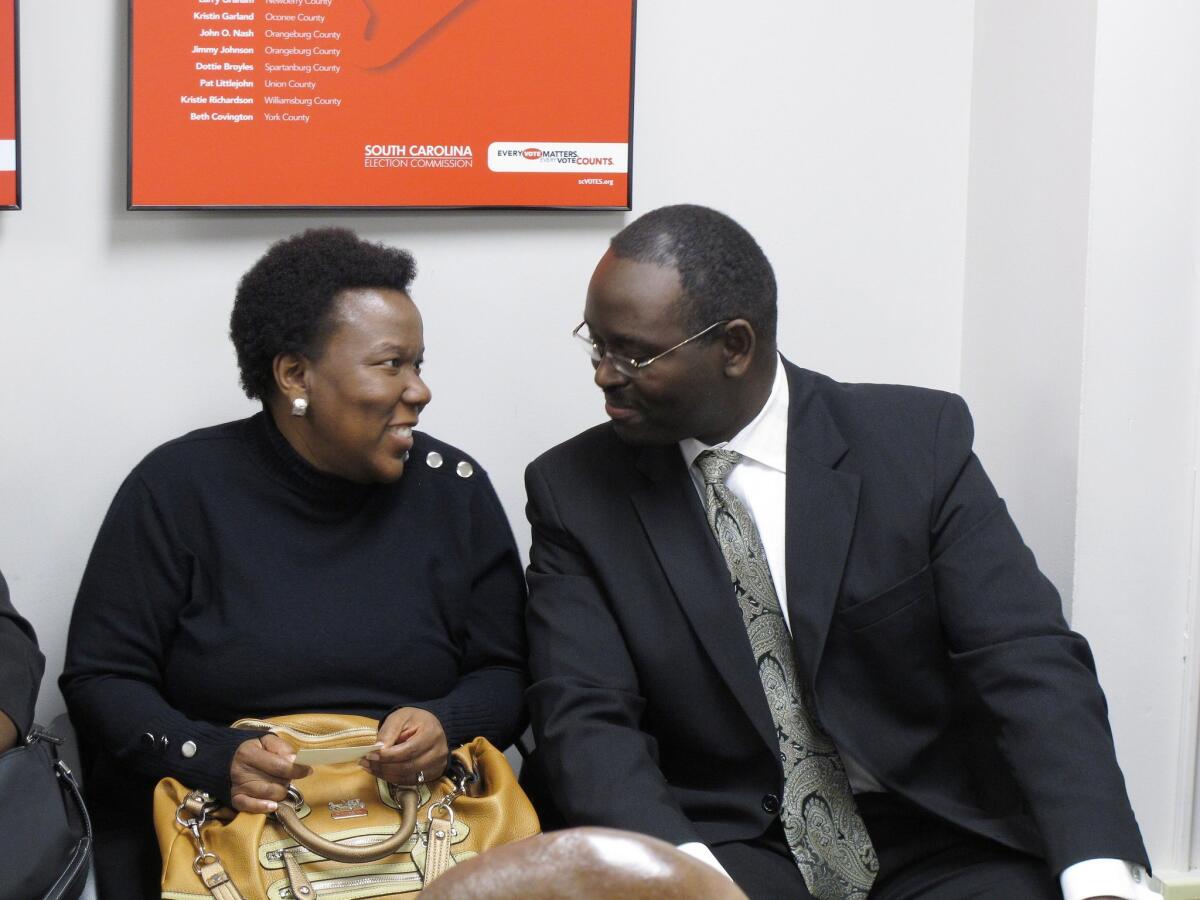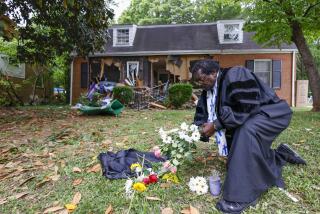For Charleston shooting victims, Emanuel AME Church was their bond

South Carolina state Sen. Clementa C. Pinckney, right, talks to a supporter during a break at a statehouse hearing in 2012. Pinckney was among nine killed by a gunman in their church in Charleston.
- Share via
It was a weekly meeting at the historic black church on Charleston’s Calhoun Street. Mothers, fathers, sisters and brothers huddled inside Emanuel African Methodist Episcopal Church on a humid Wednesday night for Bible study, led by Pastor Clementa C. Pinckney.
But the place of worship, normally a sanctuary for the suffering, turned into a killing zone when an assailant opened fire on the black parishioners in South Carolina’s second-largest city, killing Pinckney and eight others. The suspect has been identified as Dylann Storm Roof.
“We’re hurting, hurting. You see good people gunned down like dogs in a racist, hateful act of violence. It’s hurt. That’s all I can say we’re feeling,” said House Minority Leader J. Todd Rutherford, who served with Pinckney in the South Carolina Legislature. “You never think it’s going to happen to your state or your community, until it actually does.”
For Charleston’s black community, Pinckney’s death hit hard. The man known as “Clem” was not only a strong voice locally, but held sway in the statehouse where the Democrat with the booming voice has served in the Senate since 2001. Four years earlier, when he won a seat in the House at age 23, he became the youngest African American elected to the Legislature.
“Sen. Pinckney was an icon in Charleston and an icon in Columbia,” the state capital, said Rep. Peter McCoy of Charleston. “He’s a guy that I’ve always looked to, always looked up to, in terms of always being morally sound and loved by his community.”
RELATED: Charleston church shooting victims: Who they were
In homage, his seat inside the Senate chamber was draped by a black cloth. Pinckney was 41.
On Thursday, with a city in shock and a nation in mourning, an outpouring of tributes by relatives and friends was offered to many of the victims, six women and three men, ranging in age from 26 to 87, with this church as their bond.
Sharonda Singleton, 45, was on the ministerial staff at Emanuel AME Church, which might as well have been her second home. In addition to her work at the church, she was a speech pathologist and track coach at a local high school. Her son, Chris, is a sophomore who plays baseball at Charleston Southern University. “Chris’ mother was just that parent that as a coach you are proud to have as part of your program. What she brought to our team is immeasurable,” said Stuart Lake, the university’s head baseball coach.
Myra Thompson, 59, was a figure in Charleston’s black church community, where her husband, Anthony, is a reverend at Holy Trinity Reformed Episcopal Church. Daniel L. Simmons Sr., 74, was also a member of Emanuel’s ministerial staff. He died at the hospital, coroner’s officials said. Also killed was Ethel Lance, 70.
Cynthia Hurd, 54, worked as a library manager in the Charleston County Library system and was a member of the church.
DePayne Middleton-Doctor, 49, was retired but had been a longtime children’s advocate, serving as director of the Charleston County community block grant program.
Both Middleton-Doctor and Hurd were remembered Thursday as selfless individuals who worked to better the community. J. Elliott Summey, chairman of the Charleston County Council, said he was having a difficult time comprehending the idea that both women died in a city where they catered to children and to people living below the poverty line.
“All she wanted to do was go to church,” Summey said of Hurd. “I don’t understand our society. There is a reason we call it a sanctuary.” Of Middleton-Doctor, he said she had a “good heart and a good soul.”
Tywanza Sanders, the youngest victim at 26, was a longtime parishioner at Emanuel, said his friend Tory Shaw. Sanders’ parents were deeply involved in the church, Shaw said, and it was family ties that drew him to the church, where he regularly attended Bible study with his aunt, Susie Jackson, who at 87 was the oldest victim.
Family members, Shaw said, had been told that, amid the hail of bullets, Sanders desperately tried to shield his aunt. “I can’t sleep,” said Shaw, who spent the night making frantic calls to find out whether his friend survived the attack. “It’s like a bad nightmare.”
It was Pinckney who people couldn’t stop talking about Thursday, including President Obama, who acknowledged the loss in a news conference.
In South Carolina, the grief ran deep.
Dick Harpootlian, a former state Democratic Party chairman, remembered Pinckney as a “passionate and tireless advocate for his constituents.”
“The man was just honestly genuine. A genuine man,” Harpootlian said.
That came through in April, days after the shooting of Walter Scott, an unarmed black man killed by a white North Charleston, S.C., police officer.
Recently Pinckney stood before television cameras and, in eloquence, called for legislation mandating all South Carolina police officers wear body cameras. And it was Pinckney who spoke about Scott’s death before fellow senators at the Capitol in Columbia last month.
His words then resonated Thursday: “We were able to see the gunshots and we saw him fall to the ground ... to see him die face down on the ground as if he were gunned down like game. I believe, as a legislator, as a state, we have the opportunity to allow sunshine into this process to allow us new eyes into seeing.”
The legislation, which Pinckney and other members of the Legislature’s black caucus called their No. 1 priority, was passed on June 10. He saw it as a great victory.
Yet everyone knew he loved his other job maybe even more.
“He was comfortable at the Capitol, but at church he was really at home,” Rutherford said.
Tim Brown, a member of the church since 1989, said Pinckney threaded themes through his sermons that were always pointed and relevant to what was going on in the community.
When asked how the church would move forward, Brown was at a loss.
“I don’t know. I honestly do not know,” he said.
Times staff writer Matthew Hamilton contributed to this report.
More to Read
Sign up for Essential California
The most important California stories and recommendations in your inbox every morning.
You may occasionally receive promotional content from the Los Angeles Times.













